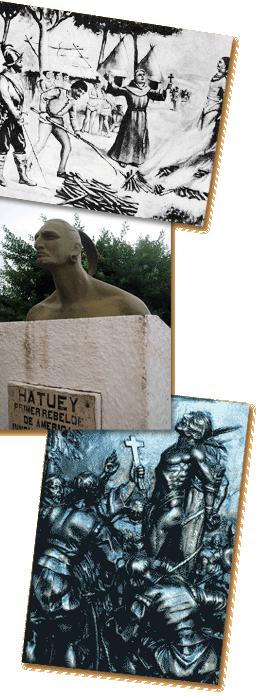Part 1 The Light of Yara
The "Eldorado" nightclub in Havana, 1931. Oscar, a young émigré poet from the Ukraine, is becoming a regular, attracted by a popular singer, Tinima. aka "La India". Tonight, "La India" (Tinima) raises the roof on the club singing a call for freedom. It is the anniversary of the martyrdom of Hatuey, a Taino chief, who resisted the Spanish in 1511, and legend says the flames that burned him at the stake can be seen to this day and are a beacon of freedom: "the Light of Yara." Oscar, who saw his own family murdered and village burned in pogroms in the Ukraine, connects deeply with Hatuey's story.
When "La India" walks up to his table and asks him to dance, he is floored; with Tinima as his muse he begins a poem in Yiddish, his native tongue, about Hatuey. As he writes, the waiter Lazaro becomes his hero, Hatuey, and the club transforms to the shores of Eastern Cuba on the eve of the arrival of the Spanish conquistador, Velasquez. Tinima works at the nightclub to support her starving family, their farm taken away by an international sugar factory. She is organizing with the waiter, Lazaro, and his fiancee, Alicia, a floorshow dancer, to supply guns for a student uprising against the dictatorial president Machado. Tinima is less interested in Oscar's poetry and more in his help collecting a package of firearms for the protests tomorrow. Oscar resists political involvement and violence but is increasingly drawn in as he learns about their cause.
When Machado's chief of security, Hernan, walks into the club setting up a "date" for "La India" with the President later that evening, Ernesto, the club Maître D, knows there will be trouble. Tinima realizes there is something behind this Yiddish poet's passionate evocation of Hatuey in his poem. They fall in love. She asks Oscar to hide two cases of "Hatuey Beer" (actually containing guns) in his apartment, Oscar reluctantly agrees to do so.
Part 2 Fever Dream
Alone in his room with two cases of guns, Oscar laments how their destructive power was given to the "Whites." The world of his poem surrounds him as Oscar witnesses what the Spanish do to the Tainos with their guns and how valiantly the tribe tries to resist, electing Hatuey as their leader. Oscar invokes the senselessness of slaughter on both sides, even as his hero Hatuey rises with his declaration of 'all for one and one for all'. When Velasquez appears, interrogating Oscar and threatening Tinima, Oscar decides to return to the club.
Part 3 Fire
At the club, President Machado tries to compel Tinima to accept his attentions. Oscar steps in, but quickly is taken away by security and locked in the basement, where Alicia — after refusing to give information — is shot. The world of Oscar's poem and the club merge. Velasquez goes hunting with a bloodhound for Hatuey. Tinima slips downstairs into the basement and urges Oscar to escape. He tells the story that haunts him, of not being able to save his best friend Ana, whom he saw raped multiple times and killed by Cossacks. Tinima assures him that she will survive, but he must save himself and his poem. Oscar is brought in to "translate" for Velasquez, and repeats Hatuey's words of resistance. Hatuey is condemned to be burned at the stake.
A Catholic priest offers Hatuey a chance to convert and go to heaven. Hatuey declines, saying, "If there are Spanish in Heaven, I prefer to go to hell." President Machado orders Hernan to "torch the place". Tinima exits on his arm; Oscar remains with Hatuey. As flames engulf the club, we see the brilliant "Light of Yara" shining as a beacon of freedom through the centuries, for in the words of the poet: "there is always another who yearns to be free." |

